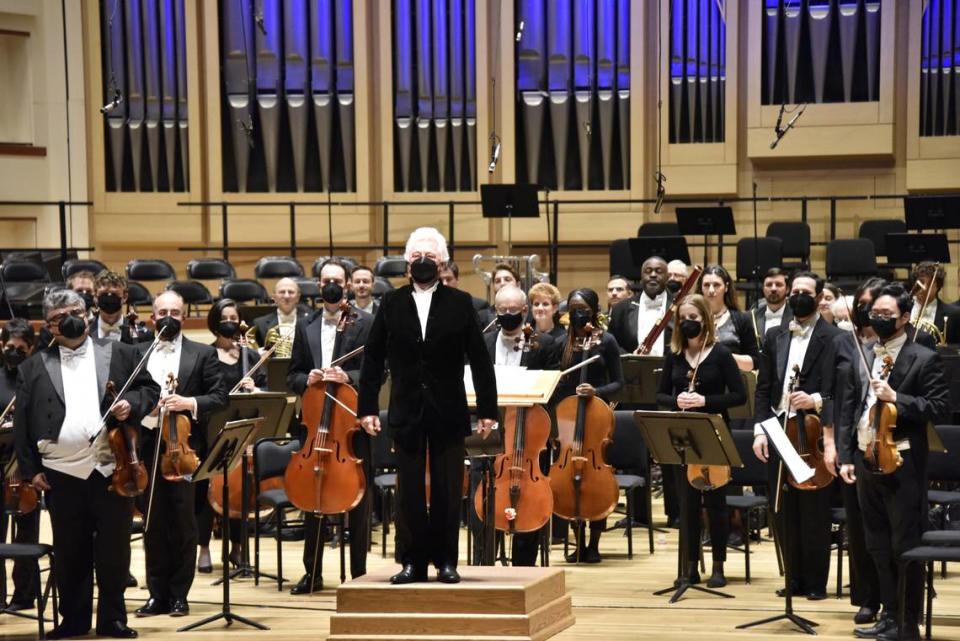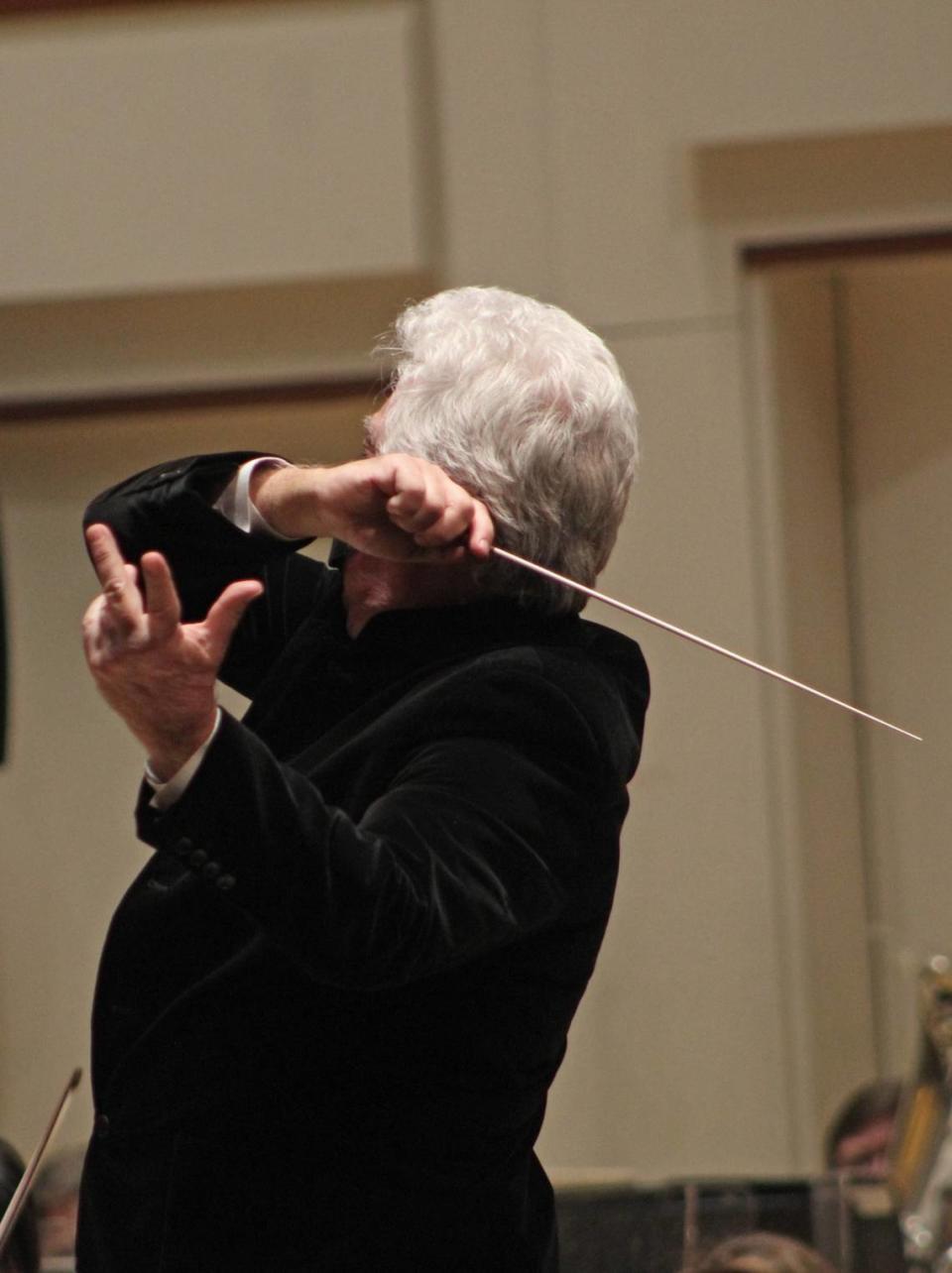Ahead of final concert, Charlotte Symphony’s maestro discusses his tenure, future plans
After 12 years leading the Charlotte Symphony Orchestra, Maestro Christopher Warren-Green is taking his final bows as music director this weekend. His tenure will end with a flourish, as he conducts Beethoven’s iconic Ninth Symphony May 20-22 at Belk Theater.
But Warren-Green isn’t entirely leaving. He will become conductor laureate and artistic adviser to the orchestra until his successor is named. Orchestra leaders have said they expect that decision to be made by 2024.
Warren-Green, who began his career as a violinist and concertmaster in the United Kingdom, will continue as music director for the London Chamber Orchestra, a group he has helmed since 1988.
While splitting time between the U.S. and U.K., Warren-Green continued to work with prominent orchestras around the world. (Prominent people too: he conducted for two British royal weddings while serving in Charlotte. He also recently conducted a Christmas concert for the king and queen of Belgium).
In Charlotte, he has worked to elevate the CSO’s stature as an international-class orchestra through appointments. Nearly half of the 62 full time musicians now playing were hired by Warren-Green.
From his 15th century thatched farmhouse in Norfolk, England, Warren-Green recently spoke with The Charlotte Observer about his upcoming performance, his time in Charlotte and what lies ahead.
This interview has been edited for length and clarity.

Why did you choose Beethoven’s ninth for your final performance? Does it have a personal meaning to you?
The ninth symphony with its “Ode to Joy” at the end was the symphony that really changed the face of classical music. And I mean the period “Classical music.” Really, we should call our music orchestral music, because it covers a lot of genres, including film, rock, and pop.
It became the most iconic piece.
Also, it’s a great celebration for me because as the last concert of my tenure, I wanted to be sure that I could have the chorus with us. The chorus was one of the big incentives for me to come to Charlotte because of the great repertoire that was written for orchestra and chorus.
Are you nervous about this performance or will it be like any other concert?
I’m always apprehensive before the first rehearsal. As you get more experience, you tend to take it in stride more.
But you wouldn’t be an artist if you didn’t feel some nervous tension. This is important for young musicians and young performers in any genre to know — that nervousness, or stage fright, is actually the same feeling as when you first fall in love.
But I’m not nervous. The orchestra and I know each other so well that we’ve even managed to do a concert without rehearsal, the “Concert for Peace,” when we had the troubles in Charlotte (in 2016 following the police killing of Keith Lamont Scott). We actually walked up and played live on WDAV and for an audience in the Belk Theater and we sight-read the entire program.
There aren’t many orchestras that can do that and our orchestra did it really well. So I’m very confident with them now.
You have said that when you came here in 2010, you decided “to stay until this orchestra is where it needs to be for Charlotte.” What did you mean by that?
My predecessor, Christof Perick, did amazing work with the orchestra but it wasn’t the international class that it is now. And I’m not trying to take full credit for that. We did it together — myself, my colleagues in the orchestra, the staff and the audience.
Charlotte is a constantly growing city. It should have an international class symphony orchestra and it’s got that now. I have every confidence that they will look after it. If not, they’ll have me to reckon with because I’m hanging around for a while.

What are your proudest achievements in Charlotte?
Without a doubt my proudest achievement is one that I didn’t do at all. It was the Project Harmony (a free after-school music program offered in conjunction with Arts+) I say, “I didn’t do.”
When I first came to Charlotte, the then-managing director wanted to see what my wife and I had done. But I put the emphasis on my wife, Rosemary, because she’s the real teacher in the family. We’d done a lot of work in Brazil with underprivileged kids and in England with kids from all different walks of life.
In our first season in Charlotte, we went into Winterfield school. It was really the incentive of the teacher (Courtney Hollenbeck). She took her violin into Winterfield school and played, and all these kids said, “We want to play,” and she didn’t know what to do.
So she called the symphony. It was what we had been talking about. And those children came on stage within half a semester and played with the symphony.
Since then, the symphony has really run with it and many players are involved. I’ve always said that the work we do with the youth is probably more important than the symphony itself, but you can’t have one without the other.
Is there anything you hoped to accomplish but haven’t?
I would like to have completed the Mahler cycle. We’ve done five of the nine Mahler symphonies and I wanted to do “Das Lied von der Erde.”
And the reason you didn’t do the others, was that because of the pandemic?
No. Ran out of tenure. No conductor can hang around too long with an orchestra where they do most of the conducting because you just drive them insane.
But I’m not going to leave them in a lurch in any way. I was very honored to be named conductor laureate. It’s a huge honor and I’m thrilled about it. But even more happy that the orchestra wanted me to remain as music adviser so we could carry on with tenures and the orchestra could be looked after, on the artistic level, until their new music director is found.
Will you be conducting other works in Charlotte in addition to Handel’s Messiah in December?
Ah, wouldn’t you like to know! Top secret, ‘cause hey look, I’m the man who didn’t leak what the royal wedding music was going to be — three royal weddings! That’s one more than Salieri did.
I mean, I won’t want to be around very much when a new music director is found, for obvious reasons. But until that time there are some projects that need looking after.

Will you expand your career in England?
I still have the London Chamber Orchestra. They’re actually putting on a concert for me in November to celebrate my 50 years as a professional, which is lovely. Actually I’m very excited because it’s easy for me to get to London. It’s quite a center of music.
When you’re a music director in America — and I did put the Charlotte Symphony first — it’s an all-encompassing job. You don’t neglect your other orchestra but there’s more you would like to get done.
For years, I’ve pond hopped. That kind of traveling takes its toll after a while. It’s rather nice for a conductor to be able to travel on trains to arrive at the engagements.
I’m quite looking forward to a concert that I’ve got in July for Radio France in the Montpellier Festival, where I’m doing Prokofiev and also a piece that I’ve wanted to do in Charlotte many times, which is Gabriel Prokofiev, his grandson’s “Concerto for Turntables.” It’s hip-hop, you know, DJs with turntables, and it’s fantastic.
Apart from being thrilled that we’re doing that, it’s not bad to be in the South of France in July.
What advice would you give to your successor?
It’s advisable not to give advice to your successor, really. But I would really love to welcome the new music director. What I would say is be yourself and enjoy your music-making and enable that orchestra to enjoy their music-making because there’s nothing else for us.
That’s what we live for, to enjoy music.
More arts coverage
Want to see more stories like this? Sign up here for our free “Inside Charlotte Arts” newsletter: charlotteobserver.com/newsletters. You can also join our Facebook group, “Inside Charlotte Arts,” by going here: facebook.com/groups/insidecharlottearts.

 Yahoo Movies
Yahoo Movies 
